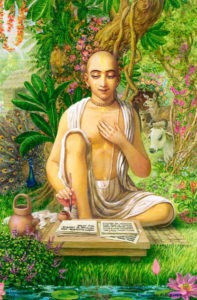 Jiva Gosvami (1513-1598) delineates his genealogy in Laghu-toshani, which is his commentary on Sanatan Gosvami’s larger work, Vaishnava-toshani.
Jiva Gosvami (1513-1598) delineates his genealogy in Laghu-toshani, which is his commentary on Sanatan Gosvami’s larger work, Vaishnava-toshani.
The genealogy is important because it embodies the little information that exists about Rupa, Sanatan, and Jiva’s familial background.
Jiva Gosvami’s life and work are emblematic of the Vaishnava way of devotion. He dedicated every moment to his mission of codifying Shri Chaitanya’s philosophy for the benefit of mankind. To this end, he organized the movement begun by the five senior Gosvamis.
Consequently, Jiva Gosvami is known as the most systematic preacher among the Six Gosvamis and has at times been called the greatest philosopher in all of Indian history. In fact, His Divine Grace A. C. Bhaktivedanta Swami Prabhupada has commented that “the Vaishnavas are by far the greatest philosophers in the world, and the greatest among them was Shrila Jiva Gosvami Prabhu…”
Jiva was the youngest and most prolific writer among the Six Gosvamis. In addition, he was the last among them to reach Vrindavan, and consequently he is not mentioned in any of the early biographies of Shri Chaitanya. Jiva is, however, glorified in several verses from Chaitanya-charitamrita, but even there it is usually in connection with the other five Gosvamis. The little that is known about Shri Jiva comes primarily from Bhakri-ratnakara, which has been quoted throughout this work, and another, earlier book (although also from the seventeenth century), called Prema-vilasa. This latter work was written by Nityananda Das, a student of Nityananda Prabhu’s wife, Jahnava-devi, and it is therefore accepted by many Chaitanyite Vaishnavas as an authoritative source.
This is a section of the Live eBook “Jiva Gosvami Prabhupada”.
To buy the complete book, click above
ESPANOL – ITALIANO
Post view 694 times



Leave a Reply